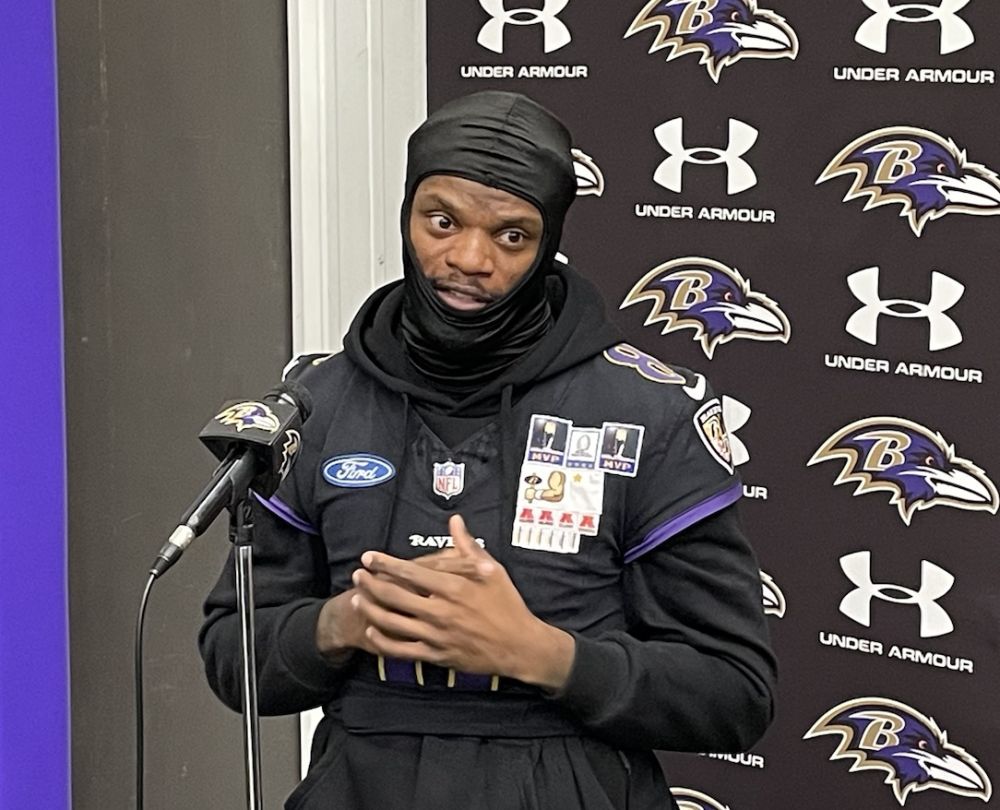As commissioner Rob Manfred announced Major League Baseball’s self-imposed lockout would cancel the start of the 2022 season on Tuesday, I kept thinking back to the Orioles’ final Friday home game last year.
You couldn’t have asked for a more beautiful evening for baseball in late September with a first-pitch temperature of 71 degrees. Cedric Mullins clubbed a home run in the second inning to become the first player in club history to hit 30 long balls and steal 30 bases in one of the more surprising seasons by an Oriole in a long time. Aside from the final score being an 8-5 loss to Texas, it was a perfectly enjoyable night for anyone going downtown to watch their final baseball game of the season.
However, the announced attendance was 7,935, with no more than a few thousand people present at Oriole Park at Camden Yards that evening. For a game that had always been on the schedule and a ballpark that had been back at full capacity for close to four months, you couldn’t really point to any dramatic circumstances explaining such a puny Friday night crowd. It was simply a staggeringly low baseline of interest.

As someone who had followed the contentious negotiations over the startup of the abbreviated 2020 season and feared the very outcome that became official on Tuesday, I tried to convince myself that MLB — the Orioles and chairman and CEO John Angelos included — couldn’t possibly have the gall and greed to shut down operations for the start of 2022. Two years after a historic pandemic prompted the cancellation of Opening Day and nearly four months of the season, upended our entire way of life, and forced sports fans to revisit how they prioritize their free time, baseball couldn’t possibly afford to go away on its own terms after fans hadn’t even been permitted to attend games in 2020, right?
Alas, the individuals running Major League Baseball once again confirmed their utter lack of interest in being stewards of the game and cultivating its long-term well-being, instead remaining hell-bent on putting every last penny in their pockets right now. And they’re taking down everyone invested in the game with them, including the MLB Players Association whose biggest fault through this mess was faring so poorly in the previous two collective bargaining agreements to allow owners to continue running away with ever-increasing revenue while player salaries stagnated and eventually decreased. How else do you explain the New York Yankees — the Yankees! — having roughly the same payroll last season as they did 15 years ago despite baseball experiencing 17 straight years of record revenue growth until the 2020 pandemic season?
The truth is that most of the public really doesn’t want to hear about the details of collective bargaining or who’s at fault because that’s not what concerns the average person spending his or her leisure time. The “both sides” and “billionaires vs. millionaires” arguments may seem disingenuous to anyone with a cursory understanding of the last century-plus of baseball’s labor practices, but the anger driving such opinions is not. Even worse could be the indifference as many will move on quickly, shifting even more attention to March Madness, NFL free agency and draft talk, the upcoming NBA and NHL postseasons, and other forms of entertainment. Yes, the most enthusiastic diehards will return like nothing happened once MLB gets around to actually playing baseball again and many will follow soon thereafter, but others already disenchanted over the myriad of issues plaguing the sport may find new ways to satisfy their free time.
Out of sight, out of mind.
MLB attendance declines following work stoppages that cost games:
1972 (-3.7%)
1981 (-6.8%)
1995 (-20%!)
Per-game attendance didn't recover the pre-strike average until 2006. …https://t.co/lKhwAtHwTR pic.twitter.com/BOmpwXBZFW— Travis Sawchik (@Travis_Sawchik) March 2, 2022
Viewing habits and attention spans in today’s fast-paced, high-tech world aren’t what they once were, and the spring and summer of 2020 offered a long glimpse of what life was like without Major League Baseball. As was the case with the players strike of 1994 that canceled the World Series for the first time in a century and delayed the start of the following season, a nontrivial portion of fans won’t return after this work stoppage. Baseball shouldn’t need a reminder — a simple look at the ratings will do — that only the NFL appears bulletproof in today’s day and age while the other sports attempt to fight off or climb beyond their niche status.
Such a reality should be of particular concern to the Orioles, who don’t have nearly as much working in their favor as they did more than a quarter-century ago. There’s also that question of a new stadium lease with the current one expiring at the end of 2023. A league-imposed work stoppage isn’t exactly the best way to garner favor with the public or the Maryland Stadium Authority.
In 1995, Camden Yards was a three-year-old jewel and the only major league destination in the Baltimore-Washington area. The civic perception of majority owner Peter Angelos couldn’t have been better after he’d restored local ownership of the club two years earlier and stood out as a rare voice of dissent among the owners during that labor dispute, refusing to vote in favor of a salary cap or field replacement players during the spring of 1995.
And, oh yeah, the iconic Cal Ripken isn’t jogging out to shortstop on Opening Day and signing autographs for two hours after games. “The Streak” won’t be providing the Orioles or the sport such extraordinary goodwill this time around.
Today, the Angelos family hasn’t nearly the same reputation after a near-three-decade ownership run consisting of seven winning seasons and five playoff appearances. You can only expect so much from Adley Rutschman’s anticipated 2022 debut or someone like Ryan Mountcastle, who — to his credit — adopted a post-game autograph routine similar to Ripken’s last season.
Regardless of your opinion on the state of a long-term rebuild or the progress being made by general manager Mike Elias, the Orioles have fielded an awful product at the major league level in recent years with the club losing at least 108 games in each of the last three full seasons. They’ve finished in last place in the American League East in four of the last five years and no higher than 27th in major league attendance since 2017. Beyond an unconditional love for the Orioles, a desire to catch an occasional game at a ballpark that remains among the best in baseball, or the rare giveaway, there’s been no compelling reason to pay major league prices to watch a club that hasn’t been prioritizing winning in the major leagues for a few years now. That approach takes a kind of toll that better result in some serious prosperity in the not-too-distant future.
But concerns should extend beyond ballpark attendance with baseball and the Orioles already suffering from an in-market accessibility problem to which they’ve appeared oblivious for years.
In an alternate universe devoid of a lockout, those subscribed to MASN — when was the last time you even turned on the network, by the way? — would already be complaining about the lack of spring training games being televised compared to most other clubs in their respective markets. Others who have cut the cable or satellite cord would be lamenting the scarcity of in-market streaming options — DirecTV’s streaming service was the only one as of the end of last season — and the absence of even a small number of local broadcasts of Orioles games on free TV.
If only I had a dollar for each time someone said to me in recent years, “I’d like to watch the Orioles, but … .”
At least they’re not alone now since we can all say the same.
In the wake of 2020 circumstances out of their control, everyone in Major League Baseball now providing fans even more time without their product and assuming they’re just going to come back is a dangerous game. For Manfred to dare say Tuesday that fans were at “the very top of our consideration list” speaks to how little the baseball establishment thinks of its paying customers and their intelligence. It’s the kind of attitude postseason TV money can only mask so long for a sport struggling to attract a younger audience.
While Manfred’s assertion last month that the cancellation of games would be the “disastrous outcome” of the owners’ lockout, the real disaster for Major League Baseball isn’t the short-term loss of revenue, a compromised season, or even the expressed anger from the fans who begrudgingly return. It’s more and more people realizing not having MLB in their lives isn’t as bad as they once thought it might be.
Even that sparse crowd at the ballpark on a September Friday night can always make other plans.
























